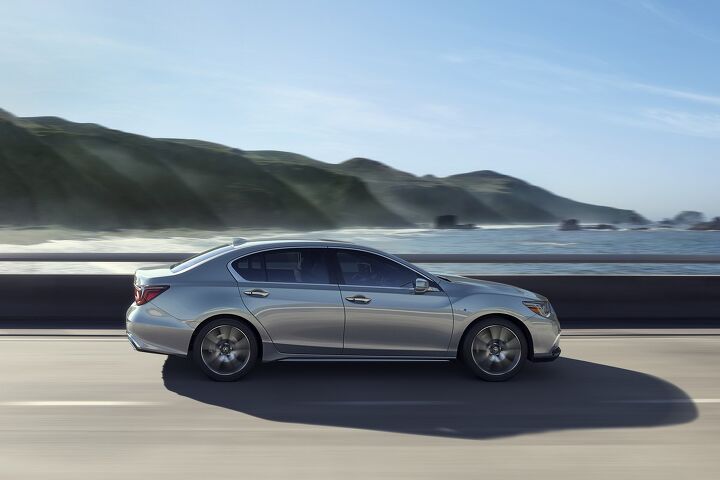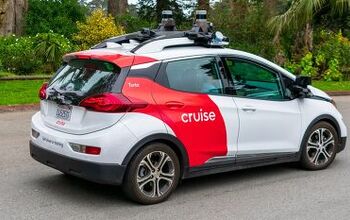QOTD: Which Sedan's Door Will the Grim Reaper Knock on Next?

None of us can predict the future, but just think of the penthouse-in-Dubai levels of cash that awaits us if we could. Alas, all we can do is follow existing trends and make a best guess.
In the automotive world, the fate of a car model lies at the intersection of sales, industry direction, and emerging technologies. SUVs and crossovers hang like a blade over the necks of all traditional passenger cars, and autonomous vehicles menace everything with a steering wheel. Electric motors threaten to turn the exhaust note into a distant memory. Governments and regulators stand in the shadows, eager to spring forth one day and spoil all of our internal combustion fun. In spite of all of these factors, there’s still bold predictions made every day about the future of the industry in five, 10, 20, 50 years.
Today, we’re asking you to peer into the Magic 8 Ball and make a prediction of your own. A very specific prediction, to be clear, and it only needs to involve one model: the next U.S.-market sedan to die.
If you say it’s either the Honda Accord or Toyota Camry, well, we know you’re just trolling. Stop it! Those models are quickly gobbling up market share in a shrinking sales pie. They’ll likely be around until the bitter end (when we’re all driving four-door SUV coupes).
Former sales champs have also taken a drubbing in recent months — among them, the newly refreshed Hyundai Sonata. Ford’s ever popular Fusion, the midsize pinnacle of engine choice, is also on its way down. Still, there’s enough volume to keep both of those models out of the cull category for some time.
Mazda has just redesigned its slinky (but hard-luck) 6, so there’s still life in that product. Perhaps we should look downmarket for the prime candidate? Ford plans to slash model configurations for future Focus sedans, but the move to build the compact in China for way less cost than before could give that model a new lease on life. If it’s still decently profitable, despite falling sales, why not keep it around for longer than planned? You know, go the FCA route.
Any member of Cadillac’s hard-luck sedan lineup doesn’t rate as a worthy answer, as we know there’s a changeover due after the 2019 model year. The nosediving ATS and CTS, along with the ancient (but still strong-selling) XTS, go into the blender that year, emerging as two wholly new models — each targeting a carefully chosen price bracket.
This author’s Magic 8 Ball doesn’t have all the answers. If it did, he’d have bought Bitcoin when it first came out, as well as some Canadian mail-order marijuana stock. Still, the Acura ILX — routinely ignored and riding on the previous-generation Civic’s platform — makes a good case for extinction. We haven’t heard any commitment to the model’s future from the folks at Acura. Adding to the suspicion is the special edition bowing for the 2018 model year.
If you listen carefully, you might just hear a swan song.
So, can you see the future? Remember, this isn’t a model you’d like to see killed; rather, it’s the next four-door sedan that will meet its maker. Name it.
[Image: Acura]

More by Steph Willems
Latest Car Reviews
Read moreLatest Product Reviews
Read moreRecent Comments
- Jkross22 Their bet to just buy an existing platform from GM rather than build it from the ground up seems like a smart move. Building an infrastructure for EVs at this point doesn't seem like a wise choice. Perhaps they'll slow walk the development hoping that the tides change over the next 5 years. They'll probably need a longer time horizon than that.
- Lou_BC Hard pass
- TheEndlessEnigma These cars were bought and hooned. This is a bomb waiting to go off in an owner's driveway.
- Kwik_Shift_Pro4X Thankfully I don't have to deal with GDI issues in my Frontier. These cleaners should do well for me if I win.
- Theflyersfan Serious answer time...Honda used to stand for excellence in auto engineering. Their first main claim to fame was the CVCC (we don't need a catalytic converter!) engine and it sent from there. Their suspensions, their VTEC engines, slick manual transmissions, even a stowing minivan seat, all theirs. But I think they've been coasting a bit lately. Yes, the Civic Type-R has a powerful small engine, but the Honda of old would have found a way to get more revs out of it and make it feel like an i-VTEC engine of old instead of any old turbo engine that can be found in a multitude of performance small cars. Their 1.5L turbo-4...well...have they ever figured out the oil dilution problems? Very un-Honda-like. Paint issues that still linger. Cheaper feeling interior trim. All things that fly in the face of what Honda once was. The only thing that they seem to have kept have been the sales staff that treat you with utter contempt for daring to walk into their inner sanctum and wanting a deal on something that isn't a bare-bones CR-V. So Honda, beat the rest of your Japanese and Korean rivals, and plug-in hybridize everything. If you want a relatively (in an engineering way) easy way to get ahead of the curve, raise the CAFE score, and have a major point to advertise, and be able to sell to those who can't plug in easily, sell them on something that will get, for example, 35% better mileage, plug in when you get a chance, and drives like a Honda. Bring back some of the engineering skills that Honda once stood for. And then start introducing a portfolio of EVs once people are more comfortable with the idea of plugging in. People seeing that they can easily use an EV for their daily errands with the gas engine never starting will eventually sell them on a future EV because that range anxiety will be lessened. The all EV leap is still a bridge too far, especially as recent sales numbers have shown. Baby steps. That's how you win people over.


































Comments
Join the conversation
My first vehicle was a truck, then a coupe, then a sedan, then two SUVs, a coupe, then a truck and now... I'm back to an anonymous sedan. A 2+2 coupe is all I needed 90% of the time but a sedan is more comfortable and being a dad I am more responsible driving a Fusion than the Mustang GT. I'm over the crap MPG and driving dynamics of SUVs though we still have one because my wife insists... and it is admittedly good for extended family road trips. Anyway... my vote for the next sedan to go bye bye is the Taurus. The Fusion can fill it's shoes (including police duty).
Well bank on the Taurus after 2018 in the US. The Impala and LaCrosse might not live past 2019. And isn't the Hyundai Azera dead after 2017? I also don't see a very long future for the Kia K-900 and Cadenza. Maybe 2020 will be their last.